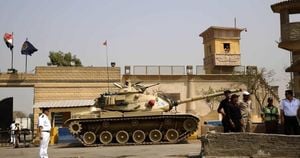Australia's Foreign Minister Penny Wong is set to play a pivotal role during Donald Trump's second inauguration as she aims to bolster Australia-U.S. relations at this politically charged moment.
Wong's presence at the inauguration on January 20, 2025, signifies the steadfast alliance between Australia and the United States, particularly amid the current geopolitical climate where both nations face challenges posed by China's assertiveness. The minister emphasized the importance of strong diplomatic ties, stating, "The invitation to attend is a demonstration of the steadfast alliance between Australia and the United States, and I look forward to representing Australia."
During her visit to Washington, Wong plans to meet with key members of the Trump administration, including the nominee for Secretary of State, Marco Rubio, to discuss shared interests ranging from economic ties to security cooperation. "Together, we continue to boost each other’s prosperity," Wong remarked, highlighting the significance of economic relations between the two countries.
The backdrop of this diplomatic engagement features heightened concerns over China’s growing influence. Wong noted, "If you look at how I and others have spoken about the challenge and opportunity China presents, including for the stability of the region, I think there’s a lot of similarity in the way we can discuss China." This perspective resonates well with the U.S., as both countries diverge at times over trade and defence strategies but remain united on key international issues.
Wong's attendance is especially timely considering Trump's proposed tariffs, potentially impacting Australian exports. She asserted her objective to negotiate aspects of these tariffs, saying, "I’d make the point... America has had a trade surplus with Australia since the Truman presidency, so that's a long time. I make the point, too, half of our Australian exports to the U.S. are inputs to U.S. production." Wong aims to advocate for Australia’s interests, pushing back against any punitive trade measures.
During her trip, Wong is expected to meet not only with U.S. officials but also with counterparts from Japan and India, who are attending the inauguration. This interaction with Quad leaders bolsters regional solidarity, as all four nations aim to maintain stability and prosperity in the Indo-Pacific.
Wong's meetings will focus on the AUKUS submarine pact, which strengthens military cooperation between Australia, the U.K., and the U.S. amid concerns about maritime security and China's ambitions. "This visit organized, we’ve seen the invitation to the inauguration, speaks for itself," Wong remarked, reflecting on the camaraderie shared between the nations as they face mutual regional threats.
Former Prime Minister Kevin Rudd, Australia’s ambassador to the U.S., has been actively working to mend relations with the Trump administration. Although he previously made controversial remarks about Trump, Rudd has sought to establish rapport and engage strategically during this visit. His efforts are corroborated by Wong's confidence in maintaining diplomatic discourse, asserting, "The meeting was a short discussion. Obviously, it went well."
The inauguration, initially planned for over 200,000 attendees, was downsized due to extreme cold weather, leading to concerns about attendance and representation. Nonetheless, Wong's attendance holds immense symbolic significance for the bilateral relationship.
Trump's administration's focus on economic revitalization and national security complements Wong's agenda. By articulately combining these themes, Wong positions Australia to strengthen its role as a steadfast ally.
Critically, Wong's visits reflect Australia's commitment to collaborate with its allies to confront growing geopolitical challenges. "The U.S... is our closest global partner, and most important strategic relationship. Together, we continue to boost each other’s prosperity," Wong reiterated, underscoring the mutual benefits of the partnership.
Finally, the ramifications of this summit can extend beyond the immediate discussions, as both nations navigate complex international dynamics, particularly concerning China. Wong's proactive approach is set to redefine how Australia engages with global partners, advocating for its interests on the world stage.



